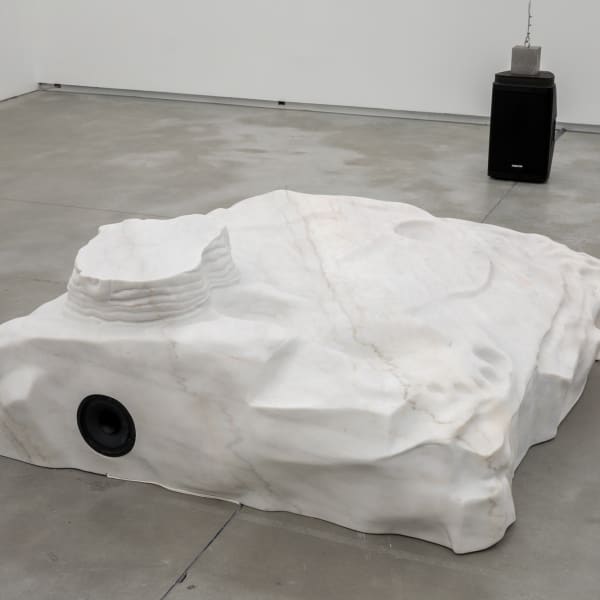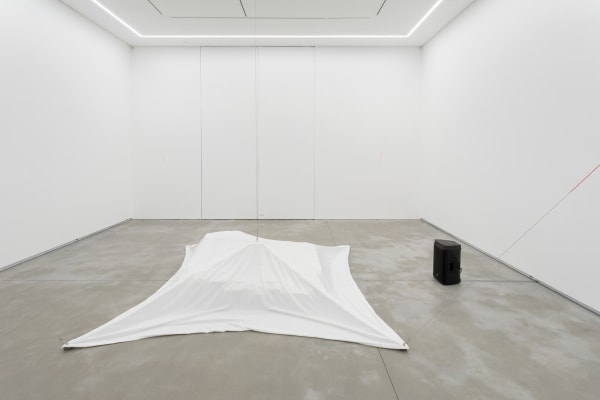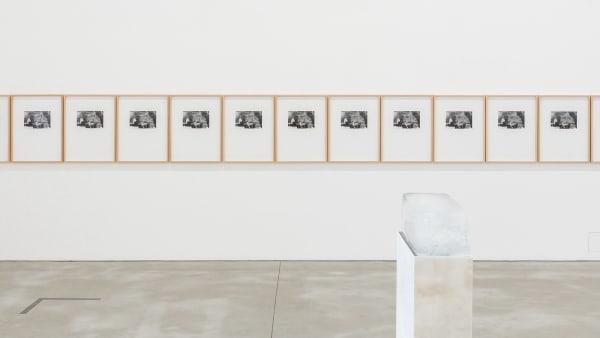Opening: Nuno Ramos
However, for some years now, monuments are alive and well, carrying a name and a surname, being denounced in the media, graffitied, torn down, thrown into rivers, beheaded, blackened with smoke, covered in red paint, taken to a municipal museum to live out their lives anonymously, like ex-spies, snitches or tyrants escaping their own biographies. Unlike Musil’s suggestion, they have returned to life, welcomed by the crowd in a tense, turbulent moment.
In 2022, I proposed (and almost made) a performance in downtown São Paulo, at Princesa Isabel Square, which has become the home for a group of addicts abandoned by public authorities. A sort of parallel city, which has been baptized as Cracolândia, ruled by the mounted police, German shepherds and water cannons, features an enormous erection right at the centre: a bronze statue of a general on horseback, wielding a sword, over an even more gargantuan plinth. The highest point of this assemblage (the tip of the sword) reaches forty metres in the air.
My idea was to re-inaugurate the square on successive occasions with different (and fake) “authorities”: a former addict dweller, a general, an actor, an aphasic person, a horse. Two cranes were to lift a cube of curtains around the forty-metre monument. Jugglers dressed as security staff would rappel down the structure causing the curtain to lift and reveal the monument. Below, the “authorities” arrived in a limousine to be greeted by photographers, passers-by, socialites, and walk on a long red carpet towards a pulpit to proffer a speech and inaugurate the enormous general once again. After returning to the limousine, the jugglers would climb to the top of the structure and let the curtain down again. This was to happen five times in succession.
This somewhat delirious plan was aborted at the last minute by São Paulo’s Cultural Secretariat, but it remained in my mind and I think that this exhibition might be, to a large extent, a consequence of it.
What does it mean to inaugurate, to open, to put out in the world? What do we expect from these symbolic accesses to the public space? What are these strange rituals, that always end up covering an object in words as they try to establish its meaning? And what is the forgotten poetry of the curtain that goes up and down to conceal and un-conceal, like a huge magician’s cloth? I wanted to return to these questions on another scale, and so imagined a physical circuit balanced between two poles: a weight that lifts the curtain and a counter-weight that activates the speech as it descends on a sound box. These two objects, the voice and the object, linked by a scale-like cable, belong to an alternate circuit: when one goes up, the other speaks; when one descends, the other falls silent.
To go from performance to sculpture by mechanizing the procedures imbued the work with a novel distancing and ironic potency, opening up possibilities that I had not considered before. I think this could be first time that my works gain an almost comical tone, like in the endless speech filled with public and private acknowledgements by the famous and the anonymous, in different languages, associated to the inauguration of a plate of lentils. At the opposite pole, the link between dozens of minutes of silence, with their trumpets and bells, clarions and bizarre horns, throat-clearing, yelps and background helicopters, and a block of ice that melts throughout the day, as if dying in front of the viewer, is truly solemn and mournful. I wanted these two extremes to be joined, simultaneous or at least contiguous, in a game of opposing cards occupying the first room at Francisco Fino Gallery.
In the second room, I wanted to examine more profoundly the relationship between speech and subject. In this case, an absent object: Michelangelo’s famous David, which vanishes to leave only its plinth. Instead of collecting my material on the internet, as I had done for Agradecimentos [Acknowledgements] and Minutos-de-silêncio [Minutes of silent], I wrote a dialogue between David, who supposedly escaped, and an interviewer who found him floating in the river Arno. This is an absent giant, who escaped his plinth, on which he left his footprints. Through scans and photographs, I faithfully reproduced the plinth sculpted by Michelangelo, and gave it a lateral speaker. This plinth, on which David is not, speaks for him, answering the interviewer’s questions coming from the sound box. This vanished cultural celebrity somehow mimeticizes the falling and rising of the curtain: it is not present when the curtain parts, but it speaks. It speaks (I hope) for all who vanished, those exhausted beings sleeping at the bottom of the Arno; those killers of giants weary of fame, admiration, endless clicks and circulation, i.e., art objects and artworks.
I write without having seen the fully installed work, but in all the tests I made, I was surprised by required precision and technical detail, the amount of stuff and the scale necessary to lift and let down a simple piece of cloth. The rehearsals, variations, small victories and big defeats lasted for months. By transforming the act of lifting a curtain into a meticulous un-concealing and concealing, I hope that a certain original silence may return to what remains underneath.
Finally, I should pay homage to the opening of Chaplin’s City Lights, one of the most scathing critiques to the rhetoric of monumentality. In it, the tramp, the undesirable part of the monument, is found sleeping under the cloth veiling the monument. The police and the authorities attending the ceremony demand that he leaves, but his departure is endlessly delayed by the very life of the monument, whom he greets apologetically by taking his hat off to it. For the tramp, the monument is alive, demanding social responses and behaviours. For the authorities, this life stands in the way of the inauguration, speeches and anthems.
I printed out one second of the film’s unveiling scene, i.e., twenty-four pictures, twenty-four images.
Nuno Ramos
-
 Nuno RamosOpening – Ice, 2023Ice, marble, satin, hoist, speaker
Nuno RamosOpening – Ice, 2023Ice, marble, satin, hoist, speaker
Speech: “Minute of Silence”Variable dimensions -
 Nuno RamosOpening – City Lights, 20231 second = 24 frames (inkjet prints on Baryta paper)68,8 x 50,1 cm (each)Edition of 3 plus 1 artist's proof
Nuno RamosOpening – City Lights, 20231 second = 24 frames (inkjet prints on Baryta paper)68,8 x 50,1 cm (each)Edition of 3 plus 1 artist's proof -
 Nuno RamosOpening – Soup, 2023Lentil soup, plate, spoon, wood, satin, hoist, speaker Speech: “Thank you”Variable dimensions
Nuno RamosOpening – Soup, 2023Lentil soup, plate, spoon, wood, satin, hoist, speaker Speech: “Thank you”Variable dimensions -
 Nuno RamosOpening – David, 2023Marble, satin, hoist, speaker
Nuno RamosOpening – David, 2023Marble, satin, hoist, speaker
Speech: David in the Arno – an interview.
Text: Nuno Ramos
Voices: Filipe Vargas (Interviewer)
João Bettencourt (David)Variable dimensions
-

Nuno Ramos: Opening
José Marmeleira 7 Mar 2023Galeria Francisco Fino is delighted to share José Marmeleira 's article on Nuno Ramo s' solo show Opening , in Contemporânea . Read full articleRead more -

Interview with Nuno Ramos in the context of the Opening exhibition at Francisco Fino Gallery
Rita Anuar 7 Mar 2023Galeria Francisco Fino is delighted to share Rita Anuar 's article on Nuno Ramos ' solo show Opening , titled Interview with Nuno Ramos in...Read more






